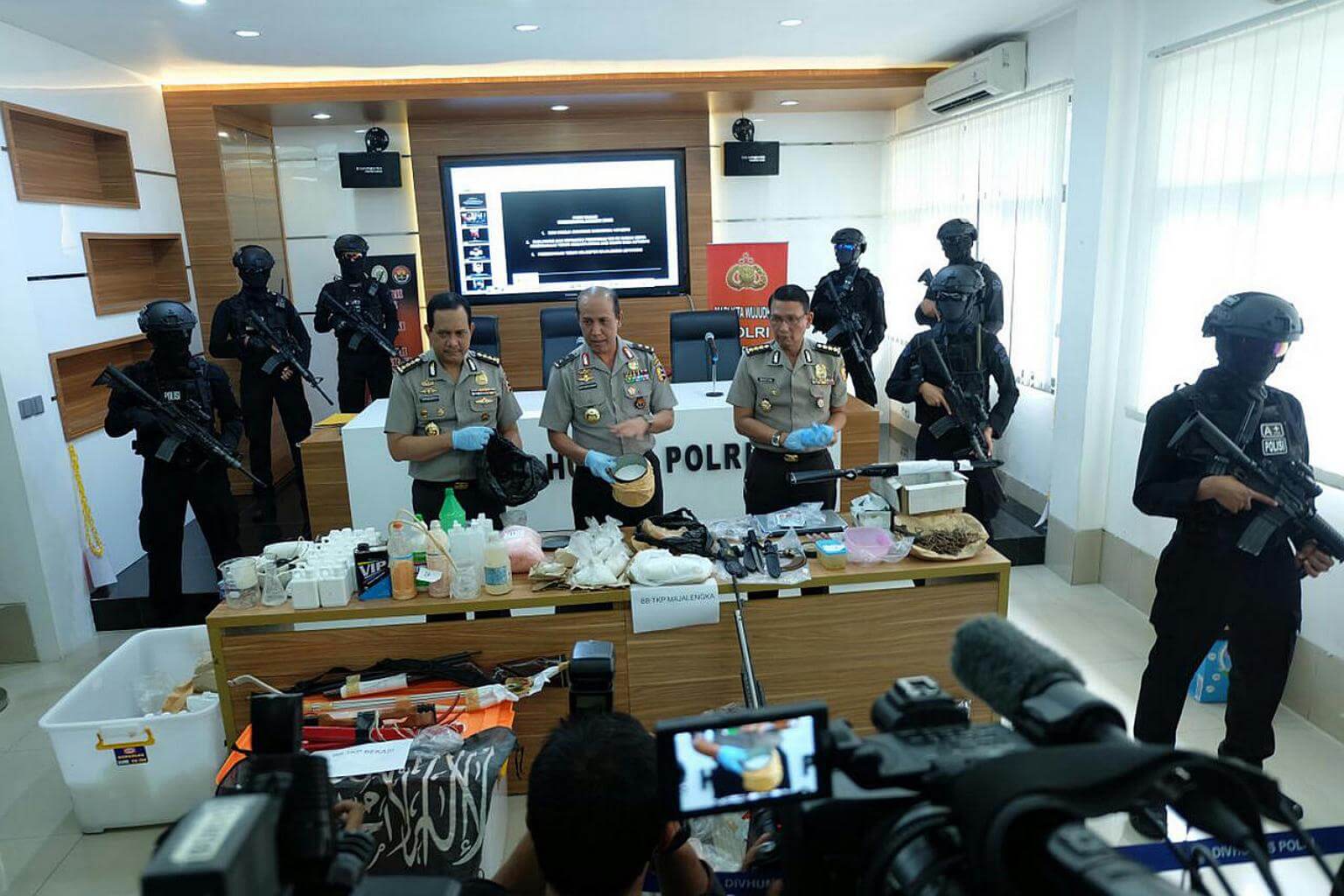Latest Indonesian terror cell uncovered has plans for December attacks, receives overseas funding
Sign up now: Get insights on Asia's fast-moving developments

Among the weapons seized from militants who are members of the terror cell in Majalengka, West Java, are air-soft rifles, daggers, high explosives, as well as a bow and arrow, said National police spokesman Inspector General Boy Rafli Amar at a media briefing on Nov 30, 2016.
PHOTO: WAHYUDI SOERIAATMADJA
Francis Chan, Wahyudi Soeriaatmadja
Follow topic:
JAKARTA - The latest Indonesian terror cell uncovered in Majalengka, West Java, had plans to strike during the December holiday season and had funding from abroad, police said.
"The Majalengka cell received funds from overseas, and the Indonesian police are working with Interpol to trace where from," said National police spokesman Inspector General Boy Rafli Amar at a media briefing on Wednesday (Nov 30).
He said the group had first hatched a plan to build a lab to make shabu-shabu, the local street name for crystal meth, or the synthetic drug methamphetamine, and sell the drugs to raise funds for their terror activities.
"The plan somehow changed, and they went ahead with making bombs which they planned to use themselves or sell them to other terror networks that needed them," said General Boy.
So far, four members of the group based in Majalengka, a regency with a population of about 1.2 million in West Java, have been arrested. They are Rio Priatna Wibawa, 23; Saiful Bahri, 30; Bahrain Agam, 36; and Hendra Rizki, 24.
Rio is a farmer who lives in Majalengka. He was arrested on Nov 23 in his home.
Saiful Bahri and Bahrain Agam were nabbed during follow-up operations over the weekend in the provinces of Banten in Java, and Aceh in Sumatra, respectively.
Hendra was arrested in Tangerang, near Jakarta, but the police did not say when.
Their targets for attack included the country's Parliament complex, police headquarters, local television stations, as well as the Myanmar Embassy, in Jakarta.
The Straits Times understands that the Myanmar mission in the capital was targeted over Naypyidaw's alleged oppression of the Rohingya Muslim ethnic minority.
The plot was thwarted by Detachment 88 (Densus 88), the elite counter-terrorism unit of the police, last Wednesday when they busted a bomb-making lab in Rio's home in Majalengka.
Besides tracing their funding, investigations are underway to establish how the cell managed to procure military-grade explosives such as TNT and RDX.
RDX is a component of C4, plastic explosives typically only used by armed forces. Quantities of the substance, large enough to cause twice the damage in the 2002 Bali bombings, were seized from Rio's home during the raid.
General Boy said the Majalengka cell bought materials that they used to make explosives off the Internet as well as a street-side stall selling chemicals in Pramuka, an area in Jakarta known for selling exotic pets and gardening materials.
The four suspects are members of Jemaah Ansharut Daulah, an offshoot of the old Jemaah Islamiah terror network, that is linked to radical ideologue Aman Abdurrahman.
It was Aman's followers who mounted the Jan 14 terror attack in Jakarta. Four of the perpetrators were killed during the siege, and at least 17 others have been arrested and charged with supporting the terrorist operation.
So far, four other militants have been sentenced to between four and 10 years over the last one month for their involvement in the incident.
General Boy also gave an update on the attack on a church in East Kalimantan on Nov 13, which killed a young toddler.
He said seven suspects have been arrested in connection with the incident in Samarinda, including two teenagers aged 16 and 17.
The 16-year-old, identified by the initials GA, was a student from Pondok Pesantren Ibnu Mas'ud, a boarding school in Bogor which police said was also linked to Aman.
tkchan@sph.com.sg
wahyudis@sph.com.sg
wahyudis@sph.com.sg

